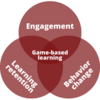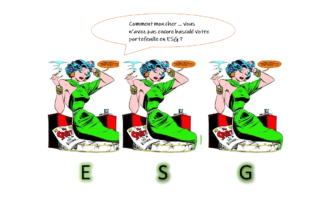Learning through play: acquiring knowledge while having fun
Learning through play: acquiring knowledge while having fun
In 2006, Gartner's research showed that the transfer and application of knowledge can be considerably accelerated through the use of games. The research recommends that companies take advantage of the deployment potential and immersive qualities of games, to reduce the time it takes to acquire new skills and deepen existing ones.
In other words, learning through play is more time-efficient, and leads to a deeper understanding and mastery of what is being learned.
Why is learning through play so relevant?
Gamification in corporate training is an important topic because it addresses three major themes for organizations: engagement, behavioral change and learning retention.
The effect on commitment

Engagement is closely linked to motivation and the desire to do one's job well. The Cambridge Dictionary defines it as "a process of encouraging people to take an interest in the work of an organization [...]".
Setting up a game is a real catalyst for getting employees out of their comfort zone and bonding with their team, while reducing resistance to the program's content, whether the attitude is open or skeptical at the outset.
In particular, the role-playing aspect of the games can help said employees to break out of their limiting beliefs and open their minds to the knowledge being imparted or discussed.
It promotes behavioral change.
Behavior change is also an important topic, especially considering the pace at which organizations are evolving and the challenges of keeping stakeholders involved and, once again, motivated.
The game encourages behavioral change because it takes place in a risk-free environment, allowing participants to try new things, while offering a situation they can easily identify with if they wish, without it being too emotionally heavy.
This field experience acquired by participants can become a source of inspiration for their own reality.
Furthermore, in a play setting, people are more willing to be authentic, more eager to share their impressions and give advice to their peers, as play blurs the politicization of the workplace.
Games are experiences: using them to convey a specific message to employees, or to recreate an environment close to reality, enables participants to better memorize and assimilate program content, while allowing them to realize the influence they have on their environment.
It improves the sustainability of learning
The last of the three themes to which learning through play is intrinsically linked is the memorization of lessons.
The famous learning pyramid classifies different types of learning according to their effectiveness in guaranteeing long-term retention of acquired knowledge.
For example, specific memories of a book you're reading right now will be much harder to retain in the long term than memories you've created by teaching the same content.

The second-best way to learn things over the long term is to put them into practice, and this is precisely what learning through play is all about.
Whether game participants are aware of it or not, they are absorbed in a game that guides them through decisions, processes and situations they will face in their real working lives.
Moreover, it will be much easier for a program participant to remember what they did while playing the game, than to remember what they read about what someone else did in a similar situation.
What learning through play means for AquaFin
If you're not already familiar with AquaFin's approach, our three pillars are as follows
- Meaningful learning - This means we focus on teaching concepts and systems that make sense to learners, that they can easily understand, and that they can reuse in their everyday tasks.
- Learn from the experts - We only work with experts in the field, i.e. professionals who have faced challenges and opportunities, and know how to deal with them.
- Learning through fun - Finally, we consider fun to be a fundamental element, and we believe it's also fundamental to a good learning experience.
In concrete terms, we exploit game-based learning by using business simulations and games in all our training programs: whether in finance, marketing, strategy, supply chain, sustainability or even project management.
All games are developed by experts in their respective fields, ensuring that participants have fun while learning something useful.
AquaFin integrates these solutions into a learning path that adds value and enables participants to build lasting memories while developing their skills.
If you're curious about how game-based learning works and how we optimize the experience for learners, stay tuned for our next article on the science behind game-based learning!
You can also contact us to experience our approach for yourself.


